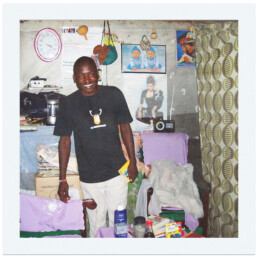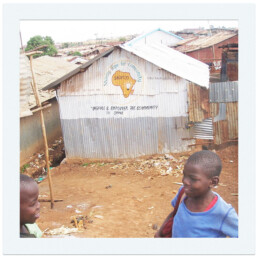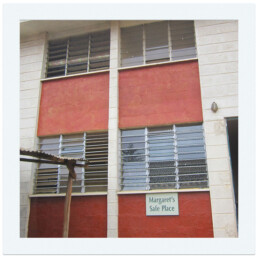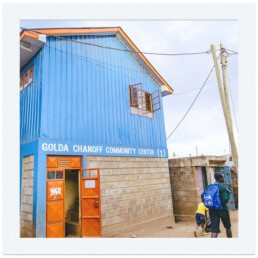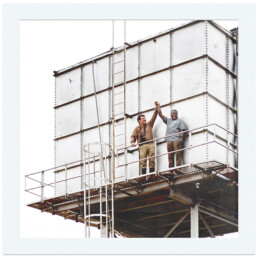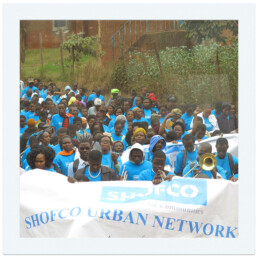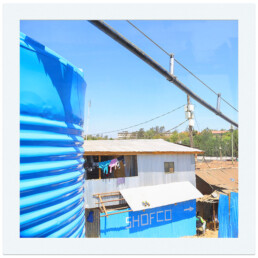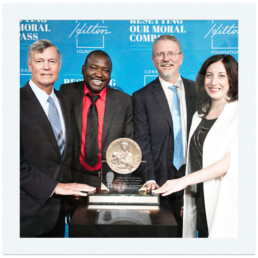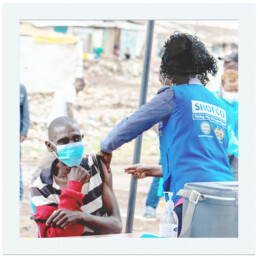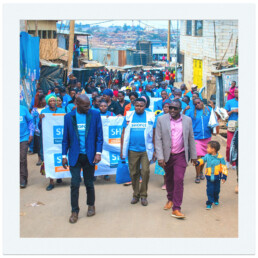Founded in 2004 by Kennedy Odede who grew up in Kenya’s largest informal settlement, SHOFCO’s celebrated approach is designed to expand community leadership.
Kennedy Odede was born in the rural village of Rarieda, just like his mother and grandmother before him. At the age of two, a famine struck the village, forcing his family to join the countless others migrating to the city in search of a better life. However, Nairobi’s lack of jobs and affordable housing led them to Kibera, one of Africa’s largest informal settlements.
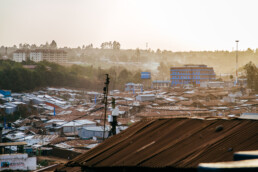
By the time he was ten, Kennedy had become a street child. Voiceless and hopeless, he survived by scavenging from garbage bins and stealing food. In a moment of desperation, he took a mango from a local market. The act nearly cost him his life, as a mob set upon him, but a stranger intervened, saving him and sparking a glimmer of hope. That moment became a turning point for Kennedy. He saw how he could change not only his life but also the lives of those in his community.
Living in Kibera for 23 years, Kennedy witnessed extreme poverty, systemic violence, lack of opportunity, and the harsh realities of gender inequality. Yet, amidst these challenges, he also saw the resilience and hope that thrived in the people around him. Inspired by leaders like Martin Luther King Jr. and Nelson Mandela, and by the strength of his mother, Kennedy believed in the power of change emerging from within the community itself. He understood that addressing gender inequality was a critical step in overcoming the barriers of urban poverty.
While working ten-hour shifts in a factory for just one dollar a day, Kennedy saved 20 cents to buy a soccer ball. It was a small but meaningful investment. Inspired by the non-violence principles of Dr. Martin Luther King Jr., Kennedy saw that soccer was something that united people in Kibera. The ball became a tool for bringing people together, creating a sense of community and shared purpose. After the games, Kennedy and his neighbors would sit together, discussing the challenges they faced and brainstorming solutions in a trusted environment. In 2004, together in community with others, he founded SHOFCO, a community-driven initiative dedicated to transforming lives in Kibera.
In 2007, Kennedy’s vision took a leap forward when he met Jessica Posner, an American student studying abroad in Kenya who is now his wife. Together, they developed SHOFCO’s holistic model, integrating access to essential services with community organizing to address the complex challenges of poverty. Their journey began in 2009 with the establishment of the Kibera School for Girls, starting with a class of 40 students. The school was founded on the belief that education equips girls—and eventually young women—with the tools to earn more, reduce their risk of HIV, and raise healthier families.
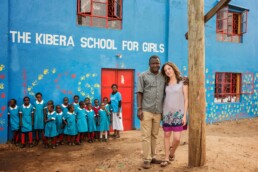
Soon after, Margaret’s Safe Place was created to provide temporary shelter, community-led counseling, and support for women and girls who were survivors of sexual and gender-based violence. Recognizing the urgent need for healthcare, SHOFCO opened its first clinic, addressing the inaccessibility and poor quality of primary healthcare in Kibera. To further expand access to knowledge and foster engagement, the Golda Chanoff Community Center was launched, offering a library, a computer room, and a community space to promote literacy and community connection.
By 2016, SHOFCO introduced a groundbreaking aerial piping system, delivering clean, affordable water to 37,000 households in Kibera. The following year, SHOFCO expanded its presence to four informal settlements, and the SHOFCO Urban Network (SUN) hosted its first peace rally, bringing together 5,000 community members. In 2018, SHOFCO’s efforts were globally recognized when it received the Conrad N. Hilton Humanitarian Prize, the world’s largest humanitarian award.
When the COVID-19 pandemic struck in 2020, SHOFCO stepped into a leadership role as international organizations pulled back. It became Kenya’s most recognized COVID-19 response organization, screening over one million residents within three months and administering 30,000 vaccines the following year. Building on the lessons from this crisis, Kennedy established the Global Alliance for Communities in 2021, a coalition designed to drive systemic change and support grassroots leadership worldwide.
In 2022, SHOFCO’s peacekeeping efforts were instrumental in ensuring Kenya’s most peaceful election process in history.
By 2027, SHOFCO will have placed 2 million young people in dignified work, protected 325,000 children from sexual and gender-based violence, prevented the school dropout of more than 181,684 girls and provided clean water and safe sanitation to 100,000 people.
The Future
As we look to the next 20 years, SHOFCO’s future lies in the continued evolution of the SHOFCO Urban Network (SUN)—a powerful blueprint with the potential to thrive in many contexts worldwide. SUN is a dynamic network of diverse groups—friends, family, and neighbors—each bringing their unique strengths and needs to the table. SUN grows organically, driven by local leaders who step up to adapt and lead the model in their own areas.

